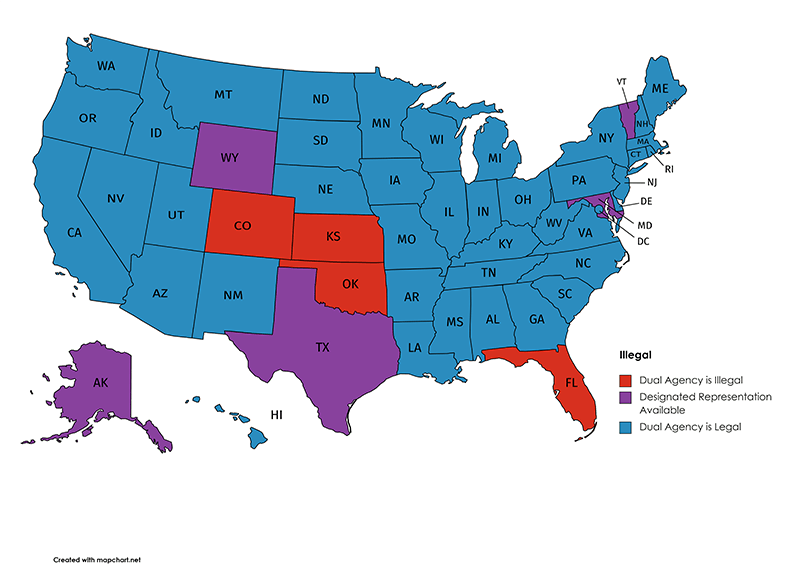Dual Agency Real Estate Laws for Each State
NOTE: I’m a real estate agent, not a lawyer. This information is correct and current to the best of my knowledge as of this writing. If you have questions, speak with your broker, lawyer, or real estate association legal hotline.
Dual agency is illegal in some states, 8 to be specific. But even 4 of those allow for designated representation which means most brokerages can fully represent both clients during a real estate transaction.
While the details are different from state to state, there are three broad categories of dual agency laws for real estate brokerages: illegal, sort of illegal, and legal. The “sort of illegal” category is how I describe designated representation, which looks a lot like dual agency even if it technically isn’t.
- Illegal. The state does not allow a brokerage to be an agent to both parties in a transaction with fiduciary obligations. If an agency relationship exists, it can only be to one party, buyer or seller. The other party is treated as a “customer”.
- Designated Representative. Dual agency is illegal, but brokers can designate or appoint a brokerage licensee to both parties of the transaction, who would each have fiduciary duties to that party similar to dual agency. Some states have rules for both dual agency and brokerage designated representation. This allows the designated representative to still offer many of the services a dual agent alone may be restricted from offering.
- Legal. Dual agency is legal and a brokerage can represent both parties. There are disclosure requirements and often limitations on what services they are able to offer both parties.

List of Dual Agency Rules by State
- Alabama. Legal. Alabama allows for a “limited consensual dual agent”. A Real Estate Brokerage Services Disclosure is required to be provided to clients describing these relationships.
- Alaska. Designated Representative. Dual agency is illegal in Alaska as of 2005, but does allow for designated representatives when fully disclosed. (read more)
- Arizona. Legal Arizona allows limited dual agency with consent. The Arizona Association of Realtors offers a Consent to Limited Representation form for disclosing. (read more)
- Arkansas. Legal. Limited dual agency allowed with written consent. (read more)
- California. Legal. California allows dual agency with consent. Agents must share agency information with prospective clients via the Disclosure Regarding Real Estate Agency Relationship. (read more)
- Colorado. Illegal. As of 2003, Colorado does not allow dual agency. They do not have designated representative status that allow brokers to appoint agents to buyers and sellers. A brokerage must represent one side of the transaction exclusively unless they are acting as an impartial “transaction broker”. (read more)
- Connecticut. Legal. Connecticut allows dual agency with consent. (read more)
- Delaware. Legal. Delaware allows dual agency and also allows for dual agent designated representatives to serve as statutory agents but not common law agents. (read more)
- Florida. Illegal. Florida does not allow dual agency. They do not have designated representative status that allow brokers to appoint agents to buyers and sellers. A brokerage must represent one side of the transaction exclusively unless they are acting as an impartial “transaction broker”. (read more)
- Georgia. Legal. Georgia allows dual agency with consent. (read more)
- Hawaii. Legal. Hawaii allows dual agency. The state association provides a dual agency consent addendum for relevant transactions. (read more)
- Idaho. Legal. Idaho allows dual agency with consent as well as designated representation, called “assigned agency”. (read more)
- Illinois. Legal. Illinois allows dual agency with consent. (read more)
- Indiana. Legal. Indiana allows dual agency as a “limited agent”, as well as designated representation, called an “In-house agency relationship”. (read more)
- Iowa. Legal. Iowa allows dual agency and designated representation (called appointed agency), and has recommended language for inclusion in dual agency contracts. (read more)
- Kansas. Illegal. Kansas does not allow dual agency. They do have designated agents, however only one agent within the brokerage may work as a designated agent while the other agent can only serve as a transaction broker. (read more)
- Kentucky. Legal. Kentucky allows dual agency as well as designated agency. (read more)
- Louisiana. Legal. Louisiana allows dual agency for arm’s length transactions and also has designated agency. (read more)
- Maine. Legal. Maine allows dual agency and also has appointed agents. (read more)
- Maryland. Designated Representative. Dual agency is technically legal in Maryland but only if each party is assigned their own intra-company agent. Maryland does not have the equivalent of a transaction broker, i.e., a one-person brokerage cannot be a dual agent. (read more)
- Massachusetts. Legal. Massachusetts allows dual agency and also has designated agents. (read more)
- Michigan. Legal. Michigan allows dual agency and also has designated agents. (read more)
- Minnesota. Legal. Minnesota allows dual agency but does not have designated representatives. (read more)
- Mississippi. Legal. Minnesota allows dual agency but does not have designated representatives. (read more)
- Missouri. Legal. Missouri allows dual agency and also has designated agents and transaction brokers. (read more)
- Montana. Legal. Montana allows dual agency and also has “in-house agent designates” for designated representation and “statutory brokers” that are the equivalent of transaction brokers. (read more)
- Nebraska. Legal. Nebraska allows dual agency but does not have designated representatives. (read more)
- Nevada. Legal. Nevada allows dual agency and also has designated agents. (read more)
- New Hampshire. Legal. New Hampshire allows dual agency and also has designated agents. (read more)
- New Jersey. Legal. New Jersey allows dual agency but does not have designated representatives. (read more)
- New Mexico. Legal. New Mexico allows dual agency and also has designated agents. (read more)
- New York. Legal. New York allows dual agency and also has designated agents. (read more)
- North Carolina. Legal. North Carolina allows dual agency and also has designated agents. (read more)
- North Dakota. Legal. North Dakota allows dual agency and also has appointed agents. (read more)
- Ohio. Legal. Ohio allows dual agency and also has designated agents. (read more)
- Oklahoma. Illegal. Oklahoma banned dual agency in 2000. They do not have designated representation available and, instead, agents may only operate as either transaction brokers or single agency. (read more)
- Oregon. Legal. Called “disclosed limited agency”, dual agency is allowed in Oregon. They do not have designated agents. (read more)
- Pennsylvania. Legal. Pennsylvania allows dual agency, and also has designated agents. (read more)
- Rhode Island. Legal. Rhode Island allows dual agency, and also has designated agents. (read more)
- South Carolina. Legal. South Carolina allows dual agency, and also has designated agents. (read more)
- South Dakota. Legal. South Dakota allow dual agency, called limite agency, and also allows appointed agents. (read more)
- Tennessee. Legal. Tennessee allows dual agency, and also has designated agents. (read more)
- Texas. Designated Representative. Dual agency is technically illegal in Texas, but Texas does allow designated representatives called “intermediary with appointments”. “Intermediary without appointments” is the equiavlent of a transaction broker. (read more)
- Utah. Legal. Utah allows dual agency, and also has designated agents called an “in-house sale”. (read more)
- Vermont. Designated Representative. Dual agency is illegal in Vermont, but firms with more than two licensees can practice designated agency. (read more)
- Virginia. Legal. Virginia allows dual agency, and also has designated agents. (read more)
- Washington. Legal. Washington allows dual agency, and also has designated agents. (read more)
- West Virginia. Legal. West Virginia allows dual agency, but does not have designated represntatives. (read more)
- Wisconsin. Legal. Wisconsin allows dual agency, and also has designated agents. (read more)
- Wyoming. Designated Representative. Dual agency is illegal in Wyoming, but firms with multiple licensees can designate represetatives to each party. (read more)
Dual Agency
Dual agency occurs when the same brokerage represents both parties in a transaction, whether buyer and seller or tenant or landlord.
I emphasized brokerage because even if clients are represented by different agents, the agents ultimately represent the broker. A dual agency situation still exists if both agents belong to the same brokerage.
States that outright disallow dual agency usually have a transaction broker agency where the agents can continue to represent both parties but only as a neutral party, giving no advice.
There is no state that does not require written consent from both buyer and seller prior to embarking on dual agency.
Some states allow dual agency but prohibit it if the agent or family member has an ownership interest in the property. You cannot represent a buyer purchasing your own home in these cases.
Designation Agency
Also called “intermediary-with-appointments” or “appointed agency”, a broker designating representatives is an alternative to dual agency. It is sometimes hard to tell apart from dual agency.
While technically not dual agency, the difference is nuanced. Texas describes the difference thusly:
A dual agent is a broker who represents two parties at the same time in accordance with common law obligations and duties. An intermediary is a broker who negotiates the transaction between the parties…
Texas Association of Realtors
When a broker represents both parties, they must be neutral and share only facts.
But a broker can alternatively do an intermediary with appointments in states that allow it. The broker appoints a licensee to the buyer and another licensee within the same brokerage to the other party.
Usually, unless you’re literally showing your own listing or in a brokerage of one person, you can easily do an intermediary with appointments when showing brokerage listings. Both buyer and seller can get most of the same fiduciary benefits of a typical agency relationship.
Transaction Brokers
Many states also have transaction broker status, also called intermediary without appointees, customer-only agency, nonagency relationships, or facilitator. These brokers do not have fiduciary duties to either buyer and seller and are instead essentially transaction managers, smoothing the process for both parties but giving no advice.
Subagency vs. Buyer Agency
In most states, an agent is a subagent for the listing agent without an explicit agreement with your buyer creating an agency relationship. You are working for the listing agent and have fiduciary obligations to the seller!
This is an uncommon relationship and certainly undesirable for most buyers. Ensure you make your buyer aware of the importance of a buyer’s representation agreement.
Some states, however, have buyer agency laws that presume agents have a fiduciary responsibility to the buyer, and not the seller as a subagent. Nebraska is an example buyer agency state.
Still other states like Oklahoma assume a neutral agency, and treat brokers like transaction brokers unless there is a representation agreement. Agents are presumed to represent neither the seller nor buyer until something written is in place.
Disclose!
Most states have disclosure requirements regarding agency, and even promulgated disclosure forms you must use.
For example, Texas has the mandatory Information About Brokerage Services that must be shared on websites, social media, email signatures, and in the first substantive contact with a prospective client.
Then, there is also an Intermediary Relationship Notice (TAR-1409), a Texas Association of Realtors form. Both buyer and seller should sign if both agents represent the same broker.
Conclusion
True “dual agency” seldom serves both buyer and seller well. There is an obvious potential conflict of interest. That is why a few states have moved to ban it altogether. Buyers and sellers are best off having their own representation and advice.
Always be sure your clients are fully education on their options for your state!


